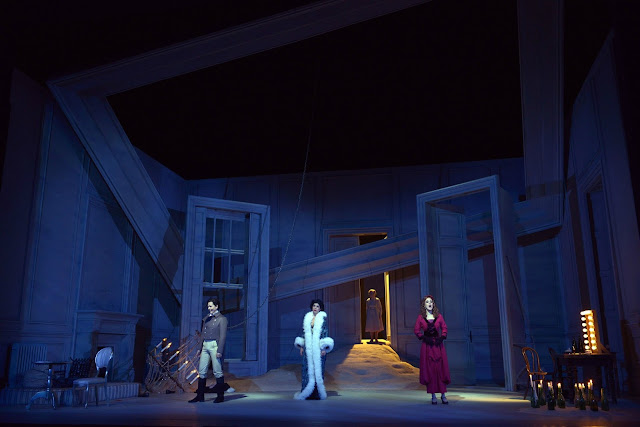 |
| Richard Strauss's Der Rosenkavalier at Theatr Magdeburg, director Olivia Fuchs. Photo by Nilz Böhme. |
 |
| Valerie Masterson as Sophie and Sandra Browne as Octavian in Der Rosenkavalier at ENO in 1975 Photograph © Sarah Quill, 1975 |
The shadow of Elisabeth Schwarzkopf hangs heavily over the role of the Marschallin in Der Rosenkavalier for people of my generation. Even though she had stopped singing the role before I started going to opera (I saw her in recital), she was the Marschallin par excellence. I have, however, been lucky enough to see some very fine Marschallin's indeed. At English National Opera there was Ava June and Valerie Masterson both in the pre-Jonathan Miller production, Yvonne Kenny, Janice Watson and Anne Evans in the Jonathan Miller production, Joan Rogers and Amanda Roocroft in the David McVicar production. Ava June was in fact my first Marschallin (at ENO in the late 1970s with Josephine Barstow as Octavian), but another early one was Catherine Wilson at Scottish Opera in 1979 in Anthony Besch's production. Whilst at Covent Garden, Marschallins have included Gwyneth Jones in the last revival of the Visconti production (which debuted in 1966), Kiri Te Kanawa, Anna Tomowa Sintow, Felicity Lott, Lucia Popp and Renee Fleming in the John Schlesinger production.
 |
| Gwyneth Jones |
In the 1970s a friend attended a performance at the Royal Opera in Stockholm with Elisabeth Södeström as the Marschallin. After Act One, the Octavian was taken ill so Södeström changed costumes and went on in Act Two as Octavian. Meanwhile the management phoned round and finally after a larger than usual second interval Act Three went on still with Södeström as Octavian and a new Marschallin, Kerstin Meyer. My friend said it was one of the most satisfying performances he had heard. And incidentally Södeström was one of the few sopranos in modern times to have performed all three roles, the Marschallin, Sophie and Octavian (another was Sena Jurinac). You can hear So's Octavian on a lovely highlights disc from Decca with Regine Crespin as the Marschallin and Hilda Gueden as Sophie, with Silvio Varviso conducting (available from Amazon).
Richard Strauss and Hugo von Hofmannsthal intended the character to be relatively young, late 30s or so; her protests of age are a little too much and we anticipate her taking further lovers after Octavian (Something which Robert Carsen's production at Covent Garden brings out well). But the role lends itself to older singers too, not just the scope of the drama but the benefits which arise from an increase in artistry, so this has almost become the norm.
 |
| Montserrat Caballe (as the Marschallinn), Otto Edelmann (as Ochs) in Der Rosenkavalier at Glyndebourne in 1965 |
Octavian too has changed somewhat over the years. The role is now almost exclusively given to mezzo-sopranos (the only soprano I recall in the role was Josephine Barstow), yet the great Sena Jurinac sang the role (she appeared at Covent Garden in 1959 with Schwarzkopf as the Marschallin) as did Södeström, Gwyneth Jones sang it in the late 1960s (though it has to be admitted that the soprano made her operatic debut as a mezzo-soprano) and Montserrat Caballe's Octavian at Glyndebourne in 1965 was soprano Teresa Zylis-Gara (a recording of the performance is available from Amazon).
As an opera, Der Rosenkavalier is a complex machine and directors meddle with the basic structure at their peril. Both Jonathan Miller and Robert Carsen have moved it to Vienna of the early 20th century with little violence, with Carsen's production (based on ideas from his 2004 Salzburg production) depicting a decadent society in decay. But most other productions I have seen have kept to the same essential structure. From photographs, Olivia Fuchs take in the opera looks intriguing and I look forward to the WNO production in the New Year. Perhaps the most intriguing was one which I never got to see. In the late 1980s WNO invited the Swedish director Göran Järvefelt to direct a new production (it featured Amanda Roocroft singing her first Sophie), but Järvefelt died before he could direct it though the set intended for his production was used for a new one by another director. What we saw was a quite traditional account, yet the set had a bright red floor which hinted at other possibilities, never to be achieved.
I do have a fantasy cast for the opera, one which would never have been realised in practice - Jessye Norman as the Marschallin (I heard her as in the title role of Richard Strauss's Ariadne auf Naxos at Covent Garden), Montserrat Caballe as Sophie (she made her UK debut singing the Marschallin at Glyndebourne) and Rita Hunter as Octavian.
Elsewhere on this blog:
- Unjustly neglected: Francesco Durante's Requiem - CD review
- Second view: Rachel Willis-Sørensen and Anna Stephany in Der Rosenkavalier - opera review
- Live buzz: James MacMillan's Symphony No. 4 and Violin Concerto - CD review
- Ambitious & brave: Louis Langree on Cincinnati Symphony Orchestra's concertos for orchestra project - interview
- Intimate and text driven: Classical Opera in Handel's Messiah - Concert review
- A touch of greatness: Renee Fleming in Der Rosenkavalier - opera review
- Delightul Handelian fantasy: All the Angels at the Sam Wanamaker Playhouse - theatre review
- The craft of writing music: Rachel Portman on writing for films, the M&S 2016 Christmas advert, and opera - interview
- Thought-provoking: Mozart's Don Giovanni from Teodor Currentzis & Musica Aeterna on Sony - CD review
- Contemporary mix: A Land so Luminous - CD review
- Vibrant music making: Arcangelo in Bach and Telemann - Concert review
- A new case for NormaBaritone Ricardo Panela considers the effect of the 1950s bel canto revival on how we listen to Bellini's opera - feature article
- Christmas with the choir of St John's College: Choral at Cadogan - concert review
- Home





%20and%20Schyler%20Vargas%20(Norman)%20on%20the%20Yellowstone%20River,%20August%202025%20Photo%20by%20Charlotte%20Mae%20Ellison.jpg)





No comments:
Post a Comment